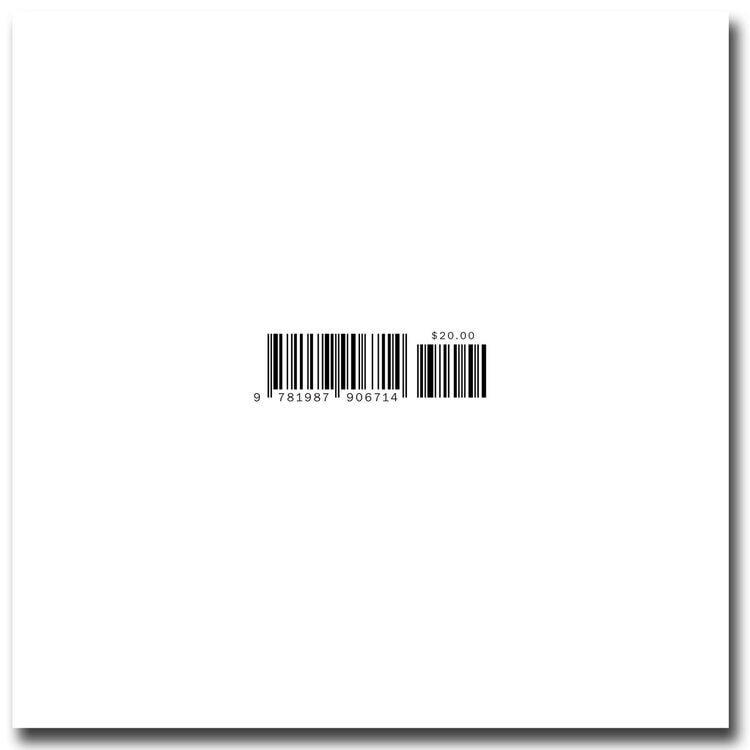Barcode Poetry
|
|
Kyle Flemmer’s first full-length book, Barcode Poetry, is as thoughtful as it is clever. The collection consists of a series of barcode poems followed by “Behind Bars,” an Afterword in which Flemmer explores the history of barcodes and the implications of his own work. The poems themselves are single lines of poetry repeated vertically 14 times with a final line of numbers at the bottom of each poem. The first and last numbers in this line track the position of an individual poem in the book, and the remaining numbers are cued to the number of characters in a word. So, for example, the word “wants” has a “5” under it, and the word “manufactured” has a “12” under it. The effect is to produce poems that are visually reminiscent of barcodes. They are so close in fact, that, if you hold the book at arms length and flip through it quickly (it is the kind of book that invites this sort of kinetic engagement), the distinction between the poems and their namesake collapses almost entirely.
This is not to say that the poems are as cold and inscrutable as these ubiquitous hallmarks of capitalism. There is a fascinating tension between the digital chill of the barcode and the manifest humanity of the poems themselves: each poem was typed out on 1940 Remington Rand Deluxe Model 5 typewriter, and the book preserves the individuality of the keystrokes, so that each letter is filled with the analogue warm of its production. There is, as you read, the constant sense of fingers depressing keys to send one arm after another whipping towards the sheet of paper, and I can’t think of a recent book that has so effectively foregrounded the corporality of its production. It is important to note that Barcode Poetry is not naively sentimental about a time before personal computers and digital printing. In “Behind Bars,” Flemmer explains that each impression made by the type against paper is unique, no matter how perfect the action of the [typewriter’s] mechanism. Manual typewriters express variation in touch, wear, and user ability. Several paragraphs later, he adds,
Barcode Poetry admittedly relies on digital imaging technologies, including a desktop scanner, photo editing software, and so forth. Despite that, this project preserves the material traces of my labour, employing technology to reproduce rather than conceal it. The book is intentionally and consciously alive to the tensions implicit in the intermeshing of the technologies of its production, and deploys those tensions to “complicate through mockery the narrative of advancement and interconnectivity that big business offers the public.”
This is, in many ways, the most self-aware of self-aware books, and, as the preceding paragraph demonstrates, the best thing a reviewer can do when discussing the complexities of the book’s production is to quote Flemmer’s Afterword. But what about the poetry? The simple answer is that it is good. The single lines are variably clever, ironic, sincere and despairing. “Boys will be business boys” sits across the page from “Girls just want sufficient funds.” We get “Theft is wrong so we copy right?,” “Epic poets charge by the character,” and “Kill the colonist inside your head.” The poems are arranged so that they move fluidly between registers, and the result is a book that is as much a pleasure to read as it is to look at and think about. There is one aspect of the book’s production that Flemmer does not address in his Afterword: the book is published through Flemmer’s own chapbook press turned small press, and is, therefore, effectively self-published. This is not surprising for a book that, as most of what The Blasted Tree publishes, straddles the line between literary object and art object, but it is worth talking about. There is a general and long-standing prohibition against self-publishing in the literary community, and it is general and long-standing for good reasons: too many self-published books of poetry are the solipsistic products of people whose writing of poetry is continuous with their refusal to read any poetry they haven’t themselves written. Barcode Poetry is as far from one of these books as it is possible to get, and the fact that Flemmer has produced it through his own press must be read in a very different light. The blurb on the back of the book explains that Barcode Poetry is positioned “against the commercialization of the culture industry,” and the book needs to be understood in the context of the anti-capitalist poetics laid out in the Afterword. There is no money in poetry. But that does not mean the system is any less capitalist: in the absence of hard currency, poets trade in cultural capital that is accrued by meeting a set of institutional benchmarks—journal publication; contest longlists, short lists and wins; chapbook publication; prize longlists, short lists, and wins; and, crucially in this instance, publication through a press. Flemmer’s refusal of this last benchmark endows the book’s politics with a genuine and refreshing sincerity. This is not to say that self-publishing in this way is a wholly pure gesture. The refusal of institutional norms can always be recuperated to the system of cultural capital. As Flemmer himself observes, “history has shown that poetry which opens a dialogue with corporatism risks being encompassed by it, made subservient to it,” and it is easy to point out that the book is for sale. But there is still power in impure gestures the way an analogue warmth is preserved in the digital reproduction of a typewriter poem, and it is the complexity of that impurity that gives this very fine book its force. Aaron Schneider is a Founding Editor at The /tƐmz/ Review. His stories have appeared/are forthcoming in The Danforth Review, Filling Station, The Puritan, Hamilton Arts and Letters, Pro-Lit, The Chattahoochee Review, BULL, Long Con, The Malahat Review and The Windsor Review. His stories have been nominated for The Journey Prize and The Pushcart Prize. His novella, Grass-Fed, was published by Quattro Books in the fall of 2018. His collection of experimental short fiction, What We Think We Know (Gordon Hill Press) was published in the fall of 2021, and his novel, The Supply Chain (Crowsnest Books), is forthcoming in Spring 2022.
|


